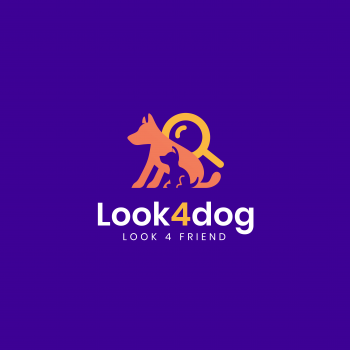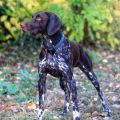The Norwegian Buhund is a versatile and energetic dog breed that hails from Norway. Known for its intelligence, agility, and friendly nature, the Buhund is a popular choice for families and individuals alike. This breed is classified as a herding dog and belongs to the Spitz and primitive type group according to the FCI (Fédération Cynologique Internationale) typology.
The history of the Norwegian Buhund dates back several centuries, with its origins rooted in the rural areas of Norway. These dogs were primarily used as herding and guarding dogs, helping farmers with their livestock and protecting their properties. The Buhund's name itself reflects its purpose, as "bu" means homestead or farm in Norwegian.
The Norwegian Buhund is a medium-sized dog, with males typically weighing between 31-40 pounds (14-18 kg) and standing around 17-18.5 inches (43-47 cm) tall at the shoulder. Females are slightly smaller, weighing between 26-35 pounds (12-16 kg) and standing around 16-17 inches (41-43 cm) tall. Their compact and muscular build allows them to be agile and quick on their feet.
In terms of appearance, the Buhund has a thick double coat that provides excellent protection against the harsh Norwegian climate. The outer coat is dense and weather-resistant, while the undercoat is soft and insulating. The coat color can vary, with shades of wheaten, black, or wolf-sable being the most common. The breed's erect ears and curled tail add to its distinctive Spitz-like appearance.
The Norwegian Buhund has a life expectancy of around 12-15 years, which is relatively long for a dog of its size. This breed is generally healthy, but like any other breed, they can be prone to certain health issues such as hip dysplasia, progressive retinal atrophy, and epilepsy. Regular veterinary check-ups and a balanced diet are essential for maintaining their overall well-being.
One of the most notable traits of the Norwegian Buhund is its intelligence. These dogs are quick learners and excel in various activities such as obedience, agility, and herding trials. They have a strong desire to please their owners and are highly trainable. Mental stimulation is crucial for this breed, as they can become bored easily if not provided with enough mental and physical exercise.
The Buhund is known for its friendly and affectionate nature, making it an excellent companion for families. They are generally good with children and get along well with other pets if properly socialized from an early age. However, their herding instincts may lead them to try and herd small children or animals, so supervision is necessary.
While the Norwegian Buhund is a versatile breed, it is important to note that they require an active lifestyle. Daily exercise, such as long walks, runs, or play sessions, is essential to keep them physically and mentally stimulated. Without adequate exercise, they may become restless and exhibit destructive behaviors.
In conclusion, the Norwegian Buhund is a remarkable dog breed with a rich history and a range of desirable traits. Their intelligence, agility, and friendly nature make them well-suited for various activities and as family pets. With proper care, training, and exercise, the Norwegian Buhund can be a loyal and loving companion for many years to come.
The Norwegian Buhund is a delightful and versatile breed known for its intelligence, loyalty, and energetic nature. These medium-sized dogs are a part of the Spitz family and have been a cherished companion in Norway for centuries. With their unique character and distinctive appearance, Norwegian Buhunds make excellent family pets and working dogs.
One of the most prominent traits of the Norwegian Buhund is their friendly and affectionate nature. They are incredibly devoted to their families and thrive on human companionship. Buhunds are known to be excellent with children, making them a great choice for families with kids. They are also generally friendly towards strangers, although they may be reserved at first. Their sociable nature makes them a poor choice for guard dogs, as they are more likely to greet an intruder with a wagging tail than with aggression.
Intelligence is another key characteristic of the Norwegian Buhund. They are quick learners and enjoy mental stimulation. This breed excels in various dog sports and activities such as obedience, agility, and herding trials. Buhunds have a strong desire to please their owners, which makes them highly trainable. However, they can be independent thinkers at times, so consistent and positive reinforcement training methods work best with them.
Due to their herding background, Norwegian Buhunds have a natural instinct to be active and energetic. They require regular exercise to keep them physically and mentally stimulated. Daily walks, playtime, and interactive games are essential to prevent boredom and destructive behavior. Buhunds also enjoy participating in dog sports or activities that allow them to utilize their herding skills.
When it comes to raising and training Norwegian Buhunds, early socialization is crucial. Exposing them to various people, animals, and environments from a young age will help them develop into well-rounded and confident dogs. Positive reinforcement training methods, such as rewards and praise, are highly effective with this breed. Harsh or punitive training techniques can lead to fear or aggression issues.
Norwegian Buhunds are generally healthy dogs with few breed-specific health concerns. However, responsible breeders will conduct health screenings for conditions such as hip dysplasia, eye diseases, and progressive retinal atrophy. Regular veterinary check-ups, a balanced diet, and proper grooming are essential for maintaining their overall well-being.
In terms of grooming, Norwegian Buhunds have a thick double coat that requires regular brushing to prevent matting and to keep their coat healthy. They shed moderately throughout the year and experience a heavier shedding period twice a year. During these times, more frequent brushing is necessary to manage the shedding.
In conclusion, Norwegian Buhunds are intelligent, loyal, and energetic dogs that make wonderful family pets. Their friendly and affectionate nature, combined with their intelligence and trainability, makes them a joy to live with. With proper socialization, training, and exercise, Norwegian Buhunds can thrive in various environments and excel in different activities. If you are looking for a versatile and devoted companion, the Norwegian Buhund may be the perfect breed for you.
The Norwegian Buhund is a beautiful and intelligent breed known for its friendly and energetic nature. To ensure the well-being and happiness of your Norwegian Buhund, it is essential to provide them with proper care and attention. Here are some tips on how to care for dogs of this breed, including what to do and what not to do:
1. Exercise: Norwegian Buhunds are an active breed that requires regular exercise to keep them physically and mentally stimulated. Aim for at least 30-60 minutes of exercise daily, including walks, playtime, and interactive activities. Engaging in activities like agility training or obedience classes can also be beneficial.
2. Mental Stimulation: Along with physical exercise, Norwegian Buhunds thrive on mental stimulation. Provide them with puzzle toys, interactive games, and training sessions to keep their minds sharp. This breed excels in various dog sports, so consider participating in activities like obedience trials or herding trials.
3. Grooming: Norwegian Buhunds have a thick double coat that requires regular grooming. Brush their coat at least once or twice a week to prevent matting and remove loose hair. During shedding seasons, daily brushing may be necessary. Trim their nails regularly, check their ears for any signs of infection, and brush their teeth frequently to maintain good oral hygiene.
4. Socialization: Early socialization is crucial for Norwegian Buhunds to develop into well-rounded dogs. Expose them to various people, animals, and environments from a young age. This will help them become confident, friendly, and adaptable companions. Enroll them in puppy classes or organize playdates with other dogs to enhance their social skills.
5. Positive Reinforcement Training: Norwegian Buhunds are intelligent and eager to please, making them highly trainable. Use positive reinforcement techniques such as treats, praise, and rewards to motivate and reinforce good behavior. Harsh training methods or punishment can lead to fear or aggression in this sensitive breed.
6. Health Care: Regular veterinary check-ups are essential to ensure your Norwegian Buhund's overall health. Vaccinations, deworming, and flea/tick prevention should be kept up to date. This breed is generally healthy, but like any dog, they can be prone to certain health issues such as hip dysplasia, progressive retinal atrophy (PRA), and thyroid disorders. Regular exercise, a balanced diet, and maintaining a healthy weight can help prevent these issues.
7. Proper Diet: Feed your Norwegian Buhund a high-quality, balanced diet that suits their age, size, and activity level. Consult with your veterinarian to determine the appropriate portion sizes and feeding schedule. Avoid overfeeding, as Norwegian Buhunds can easily gain weight, which can lead to health problems.
8. Avoid Overheating: Norwegian Buhunds have a thick double coat that provides insulation in colder weather. However, they can be sensitive to heat. Avoid exercising them during the hottest parts of the day, provide shade and fresh water, and never leave them in a hot car. Be cautious during summer months to prevent heatstroke.
9. Avoid Boredom: Norwegian Buhunds are prone to boredom if left alone for long periods. They may become destructive or develop behavioral issues. Ensure they have plenty of toys, interactive puzzles, and companionship to keep them mentally stimulated and entertained.
10. Love and Affection: Lastly, Norwegian Buhunds are incredibly loving and loyal dogs. Shower them with love, attention, and affection. They thrive on being part of the family and will reward you with their unwavering loyalty and companionship.
By following these tips, you can provide the best care for your Norwegian Buhund, ensuring they lead a happy, healthy, and fulfilling life as your beloved companion.
The Norwegian Buhund is a beautiful and versatile breed of dog that is known for its striking appearance and distinctive coat color. The common color of Norwegian Buhund dogs is a rich and warm shade of wheaten. This color is often described as a medium to dark golden hue, resembling the color of ripe wheat fields in the summer sun.
The wheaten color of the Norwegian Buhund's coat is truly captivating. It is a solid color that covers the entire body, from the tip of the nose to the end of the tail. The coat is dense and weather-resistant, providing protection against the harsh Norwegian climate. The wheaten color is evenly distributed throughout the body, with no markings or patterns present.
When observing a Norwegian Buhund, one can appreciate the depth and intensity of their coat color. The wheaten shade can vary slightly from dog to dog, with some individuals having a lighter or darker hue. However, the overall impression is that of a warm and inviting color that exudes a sense of vitality and energy.
The wheaten color of the Norwegian Buhund's coat is complemented by its texture and shine. The coat is double-layered, with a soft and dense undercoat that provides insulation and a longer, harsher outer coat that protects against the elements. This combination gives the coat a lustrous appearance, with the wheaten color shimmering in the light.
In addition to the wheaten color, Norwegian Buhund dogs may also have small white markings on their chest or feet. These markings are considered acceptable within the breed standard and add a touch of contrast to the overall appearance of the dog. However, excessive white markings or any other color variations are not desirable in this breed.
The wheaten color of the Norwegian Buhund's coat is not only aesthetically pleasing but also serves a practical purpose. In their native Norway, these dogs were primarily used as herding and guarding dogs, working in various weather conditions. The wheaten color allowed them to blend in with their surroundings, making them less visible to potential predators and helping them perform their duties effectively.
In conclusion, the common color of Norwegian Buhund dogs is a stunning wheaten shade that is both visually appealing and functional. This rich and warm color, combined with the dog's dense and lustrous coat, creates a striking appearance that is sure to turn heads. Whether working in the fields or lounging at home, the Norwegian Buhund's coat color is a true testament to the breed's beauty and versatility.
The Norwegian Buhund is a robust and healthy breed known for its endurance and agility. These medium-sized dogs have a life expectancy of around 12 to 15 years, and with proper care, they can lead a long and healthy life. However, like all breeds, Norwegian Buhunds are prone to certain health issues that owners should be aware of.
One of the most common health concerns in Norwegian Buhunds is hip dysplasia. This is a genetic condition where the hip joint doesn't develop properly, leading to arthritis and mobility issues. Responsible breeders will screen their breeding dogs for hip dysplasia to reduce the risk of passing it on to offspring. Regular exercise, a balanced diet, and maintaining a healthy weight can help manage this condition.
Another health issue that can affect Norwegian Buhunds is progressive retinal atrophy (PRA). PRA is a degenerative eye disease that leads to vision loss and, in severe cases, blindness. Regular eye examinations by a veterinary ophthalmologist can help detect PRA early on, allowing for appropriate management and lifestyle adjustments to accommodate the dog's changing vision.
Like many other breeds, Norwegian Buhunds can also be prone to allergies. These allergies can manifest as skin irritations, itching, and gastrointestinal issues. Identifying and eliminating potential allergens from the dog's environment, such as certain foods or environmental triggers, can help manage these allergies. In some cases, medication or hypoallergenic diets may be necessary.
It's important to note that not all Norwegian Buhunds will develop these health issues, and responsible breeders strive to minimize the risk through selective breeding and health testing. However, it's crucial for potential owners to be aware of these potential concerns and to choose a reputable breeder who prioritizes the health and well-being of their dogs.
To care for the health of Norwegian Buhunds, regular veterinary check-ups are essential. These check-ups should include vaccinations, dental care, and parasite prevention. Maintaining a healthy weight through a balanced diet and regular exercise is crucial to prevent obesity and related health issues.
Norwegian Buhunds are an active breed that requires mental and physical stimulation. Regular exercise, such as daily walks, playtime, and training sessions, will help keep them physically fit and mentally stimulated. Mental enrichment activities, such as puzzle toys or obedience training, can also help prevent boredom and destructive behaviors.
Proper grooming is also important for the health of Norwegian Buhunds. They have a double coat that requires regular brushing to prevent matting and to remove loose hair. Additionally, regular ear cleaning, nail trimming, and dental care are necessary to maintain overall hygiene and prevent infections.
In conclusion, Norwegian Buhunds are generally a healthy breed, but like all dogs, they can be prone to certain health issues. Responsible breeding practices, regular veterinary care, a balanced diet, and appropriate exercise and mental stimulation are key to ensuring the health and well-being of these wonderful dogs.
The Norwegian Buhund is a medium-sized, energetic, and intelligent breed of dog that requires a well-balanced and nutritious diet to maintain optimal health and vitality. Proper nutrition plays a crucial role in their overall well-being, including their growth, development, and immune system.
When it comes to feeding a Norwegian Buhund, it is important to provide them with high-quality dog food that meets their specific nutritional needs. Look for dog food that is specifically formulated for active breeds or working dogs, as these will typically contain the right balance of proteins, fats, and carbohydrates.
Protein is an essential component of a Norwegian Buhund's diet as it helps support their muscle development and repair. Look for dog food that lists a high-quality source of animal protein, such as chicken, beef, or fish, as the first ingredient. Avoid dog foods that contain excessive amounts of fillers or by-products, as these may not provide the necessary nutrients.
Fats are another important component of a Norwegian Buhund's diet, as they provide a concentrated source of energy. Look for dog food that contains healthy fats, such as omega-3 and omega-6 fatty acids, which can help support their skin and coat health. Fish oil or flaxseed oil supplements can also be beneficial in providing these essential fatty acids.
Carbohydrates are a source of energy for dogs, but it is important to choose complex carbohydrates that are easily digestible. Look for dog food that contains whole grains like brown rice or oats, as these provide a steady release of energy and are less likely to cause digestive issues. Avoid dog foods that contain excessive amounts of corn, wheat, or soy, as these can be harder for dogs to digest and may cause allergies or sensitivities.
In addition to a balanced diet, Norwegian Buhunds should have access to fresh water at all times. Hydration is essential for their overall health and helps support proper digestion and nutrient absorption.
It is important to feed Norwegian Buhunds in appropriate portion sizes to prevent obesity. Obesity can lead to various health issues, including joint problems and decreased lifespan. Consult with your veterinarian to determine the appropriate amount of food to feed your dog based on their age, weight, and activity level.
While it is tempting to share human food with your Norwegian Buhund, it is important to avoid certain foods that can be toxic or harmful to dogs. Some common foods to avoid include chocolate, grapes, raisins, onions, garlic, avocados, and foods high in salt or sugar. Additionally, be cautious of feeding your dog bones, as they can splinter and cause choking or internal injuries.
Lastly, regular exercise is essential for Norwegian Buhunds to maintain a healthy weight and overall well-being. Along with a nutritious diet, ensure they get plenty of physical activity, such as daily walks, playtime, or engaging in dog sports or activities.
Remember, every dog is unique, and their nutritional needs may vary. It is always recommended to consult with your veterinarian for personalized advice on feeding and nutrition for your Norwegian Buhund.





